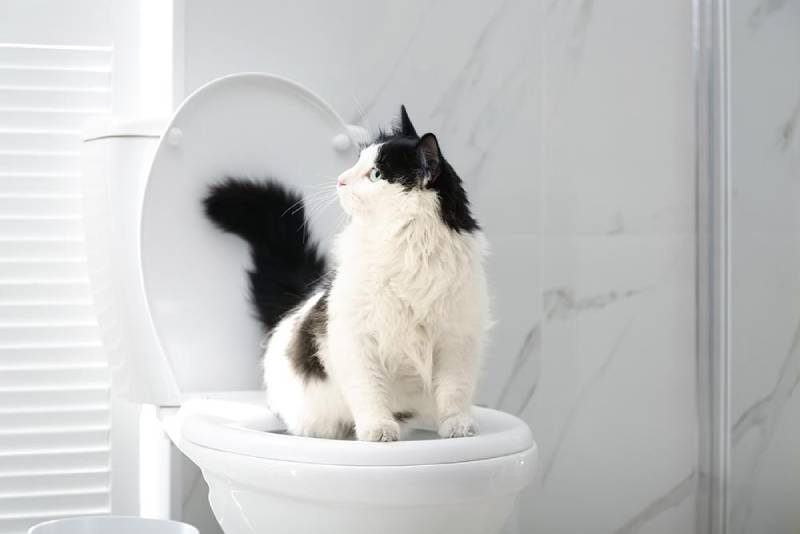Why You Shouldn't Flush Cat Poop Down Your Toilet - Maintain Your Plumbing Health
Why You Shouldn't Flush Cat Poop Down Your Toilet - Maintain Your Plumbing Health
Blog Article
We've discovered the article on Can You Flush Cat Poo or Litter Down the Toilet? down the page on the net and decided it made perfect sense to discuss it with you here.

Introduction
As pet cat owners, it's essential to bear in mind how we dispose of our feline friends' waste. While it may seem hassle-free to purge cat poop down the bathroom, this method can have damaging effects for both the setting and human health and wellness.
Alternatives to Flushing
Fortunately, there are much safer and much more liable methods to throw away pet cat poop. Consider the complying with options:
1. Scoop and Dispose in Trash
One of the most usual approach of taking care of pet cat poop is to scoop it right into a biodegradable bag and throw it in the trash. Make sure to make use of a committed clutter inside story and take care of the waste promptly.
2. Usage Biodegradable Litter
Opt for naturally degradable feline clutter made from materials such as corn or wheat. These trashes are environmentally friendly and can be securely disposed of in the trash.
3. Hide in the Yard
If you have a backyard, take into consideration hiding feline waste in an assigned area far from veggie gardens and water sources. Be sure to dig deep enough to prevent contamination of groundwater.
4. Mount a Pet Waste Disposal System
Buy a pet dog garbage disposal system particularly developed for cat waste. These systems use enzymes to break down the waste, reducing smell and ecological influence.
Health and wellness Risks
In addition to ecological problems, flushing pet cat waste can additionally position health and wellness risks to human beings. Feline feces may contain Toxoplasma gondii, a bloodsucker that can trigger toxoplasmosis-- a potentially extreme disease, particularly for expecting women and people with damaged body immune systems.
Ecological Impact
Flushing pet cat poop introduces hazardous pathogens and bloodsuckers into the water supply, posturing a significant danger to aquatic ecosystems. These impurities can negatively influence marine life and compromise water high quality.
Conclusion
Liable animal ownership prolongs beyond giving food and shelter-- it likewise involves proper waste monitoring. By avoiding flushing pet cat poop down the toilet and opting for different disposal methods, we can lessen our environmental impact and protect human health and wellness.
Why Can’t I Flush Cat Poop?
It Spreads a Parasite
Cats are frequently infected with a parasite called toxoplasma gondii. The parasite causes an infection called toxoplasmosis. It is usually harmless to cats. The parasite only uses cat poop as a host for its eggs. Otherwise, the cat’s immune system usually keeps the infection at low enough levels to maintain its own health. But it does not stop the develop of eggs. These eggs are tiny and surprisingly tough. They may survive for a year before they begin to grow. But that’s the problem.
Our wastewater system is not designed to deal with toxoplasmosis eggs. Instead, most eggs will flush from your toilet into sewers and wastewater management plants. After the sewage is treated for many other harmful things in it, it is typically released into local rivers, lakes, or oceans. Here, the toxoplasmosis eggs can find new hosts, including starfish, crabs, otters, and many other wildlife. For many, this is a significant risk to their health. Toxoplasmosis can also end up infecting water sources that are important for agriculture, which means our deer, pigs, and sheep can get infected too.
Is There Risk to Humans?
There can be a risk to human life from flushing cat poop down the toilet. If you do so, the parasites from your cat’s poop can end up in shellfish, game animals, or livestock. If this meat is then served raw or undercooked, the people who eat it can get sick.
In fact, according to the CDC, 40 million people in the United States are infected with toxoplasma gondii. They get it from exposure to infected seafood, or from some kind of cat poop contamination, like drinking from a stream that is contaminated or touching anything that has come into contact with cat poop. That includes just cleaning a cat litter box.
Most people who get infected with these parasites will not develop any symptoms. However, for pregnant women or for those with compromised immune systems, the parasite can cause severe health problems.
How to Handle Cat Poop
The best way to handle cat poop is actually to clean the box more often. The eggs that the parasite sheds will not become active until one to five days after the cat poops. That means that if you clean daily, you’re much less likely to come into direct contact with infectious eggs.
That said, always dispose of cat poop in the garbage and not down the toilet. Wash your hands before and after you clean the litter box, and bring the bag of poop right outside to your garbage bins.
https://trenchlesssolutionsusa.com/why-cant-i-flush-cat-poop/

Do you appreciate reading about Can You Flush Cat Poo or Litter Down the Toilet?? Try leaving a remark directly below. We'd be interested to listen to your feelings about this posting. We hope that you come back again in the future. Liked our entry? Please share it. Let others locate it. I truly appreciate reading our article about Can You Flush Cat Poo or Litter Down the Toilet?.
Visit My Web Page Report this page